#post cyberpunk
Text
Kickstarting the Red Team Blues audiobook, which Amazon won't sell (read by Wil Wheaton!)
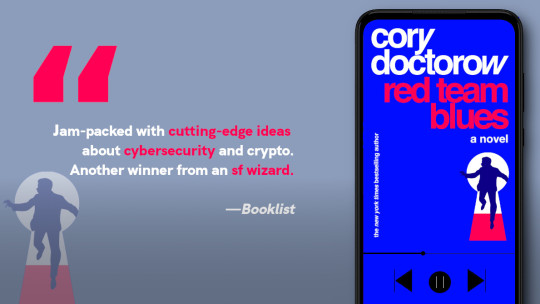
Red Team Blues is my next novel, a post-cyberpunk anti-finance finance thriller; it’s a major title for my publishers Tor Books and Head of Zeus, and it’s swept the trade press with starred reviews all ‘round. Despite all that, Audible will not sell the audiobook. In fact, Audible won’t sell any of my audiobooks. Instead, I have to independently produce them and sell them through Kickstarter:
https://www.kickstarter.com/projects/doctorow/red-team-blues-another-audiobook-that-amazon-wont-sell
If you’d like an essay-formatted version of this post to read or share, here’s a link to it on pluralistic.net, my surveillance-free, ad-free, tracker-free blog:
https://pluralistic.net/2023/03/21/anti-finance-finance-thriller/#marty-hench
Audible is Amazon’s monopoly audiobook platform. It has a death-grip on the audiobook market, commanding more than 90% of genre audiobook sales, and every single one of those audiobooks is sold with Amazon’s DRM on it. That means that you can’t break up with Amazon without throwing away those audiobooks. Under the 1998 Digital Millennium Copyright Act, I can’t give you a tool to convert my own copyrighted audiobooks to a non-Amazon format. Doing so is a felony carrying a five year prison sentence and a $500,000 fine for an act that in no way infringes anyone’s copyright! Indeed, merely infringing copyright is much less illegal than removing Amazon’s mandatory DRM from my own books!
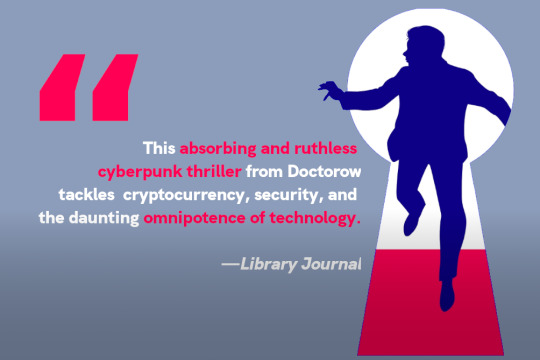
I’ve got amazing publishers who support my crusade against DRM, but they’re not charities. If they can’t sell my audiobooks on the platform that represents 90% of the market, they’re not going to make audio editions at all. Instead, I make my own audiobooks, using brilliant voice actors like Amber Benson and @neil-gaiman, and I sell them everywhere except Audible.
Doing this isn’t cheap: I’m paying for an incredible studio (Skyboat Media), a world-class director (Gabrielle de Cuir), top-notch sound editing and mastering, and, of course, killer narrators. And while indie audiobook platforms like Libro.fm and downpour.com are amazing, the brutal fees extracted by Apple and Google on app sales means that users have to jump through a thousand hoops to shop with indie stores. Most audiobook listeners don’t even know that these stores exist: if a title isn’t available on Audible, they assume no audiobook exists.

That’s where Kickstarter comes in: twice now, I’ve crowdfunded presales of my audiobooks through KS, and these campaigns were astoundingly successful, smashing records and selling thousands of audiobooks. These campaigns didn’t just pay my bills (especially during lockdown, when our household income plunged), but they also showed other authors that it was possible to evade Amazon’s monopoly chokepoint and sell books that aren’t sticky-traps for Audible’s walled garden/prison:
https://www.publishersweekly.com/pw/by-topic/columns-and-blogs/cory-doctorow/article/90282-we-wrote-a-book-about-why-audible-won-t-sell-our-book-and-snuck-it-onto-audible.html
And today, I’m launching the Kickstarter for Red Team Blues, and even by the standards of my previous efforts, I think this one’s gonna be incredible.
https://www.kickstarter.com/projects/doctorow/red-team-blues-another-audiobook-that-amazon-wont-sell
For starters, there’s the narrator: @wilwheaton, whose work on my previous books is outstanding, hands-down my favorite (don’t tell my other narrators! They’re great too!):
https://wilwheaton.net/
Beyond Wil’s narration, there’s the subject matter. The hero of Red Team Blues is a hard-charging forensic accountant who’s untangled every Silicon Valley finance scam since he fell in love with spreadsheets as as a MIT freshman, dropped out, got his CPA ticket, and moved west. Now, at the age of 67, Marty Hench is ready to retire, but a dear old friend — a legendary cryptographer — drags him back for one last job — locating the stolen keys to the backdoor he foolishly hid in a cryptocurrency that’s worth more than a billion dollars.

That’s the starting gun for a “grabby next-Tuesday thriller” that sees Marty in between three-letter agencies and international crime syndicates, all of whom view digital technology as a carrier medium for scams, violence and predation. Marty’s final adventure involves dodgy banks, crooked crypto, and complicit officials in a fallen paradise where computers’ libertory promise has been sucked dry by billionaire vampires.
It’s a pretty contemporary story, in other words.
I wrote this one before SVB, before Sam Bankman0Fried and FTX — just like I wrote Little Brother before Snowden’s revelations. It’s not that I’m prescient — fortune-telling is a fatalist’s delusion — it’s that these phenomena are just the most spectacular, most recent examples in a long string of ghastly and increasingly dire scandals.
Red Team Blues blasted out of my fingertips in six weeks flat, during lockdown, when technology was simultaneously a lifeline, connecting us to one another during our enforced isolation; and a tool of predatory control, as bossware turned our “work from home” into “live at work.”
The last time I wrote a book that quickly, it was Little Brother, and, as with Little Brother, Red Team Blues is a way of working out my own anxieties and hopes for technology on the page, in story.

These books tap into a nerve. I knew I had something special in my hands when, the night after I finished the first draft, I rolled over at 2AM to find my wife sitting up in bed, reading.
“What are you doing?” I asked.
“I had to find out how it ended,” she answered.
The next day, my editor sent me a four-line email:
That.
Was.
A! Fucking! Ride!
Whoa!
Within a week, he’d bought Red Team Blues…and two sequels. I finished writing the second of these on Monday, and all three are coming out in the next 22 months. It’s gonna be a wild ride.

Kickstarter backers can get the usual goodies: DRM-free audiobooks and ebooks, hardcovers (including signed and personalized copies), and three very special, very limited-run goodies.
First, there’s naming rights for characters in the sequels — I’m selling three of these; they’re a form of cheap (or at least, reasonably priced) literary immortality for you or a loved one. The sequels are a lot of fun — they go in reverse chronology, and the next one is The Bezzle, out in Feb 2024, a book about prison-tech scams, crooked LA County Sheriff’s Deputy gangs, and real-estate scumbags turned techbros.
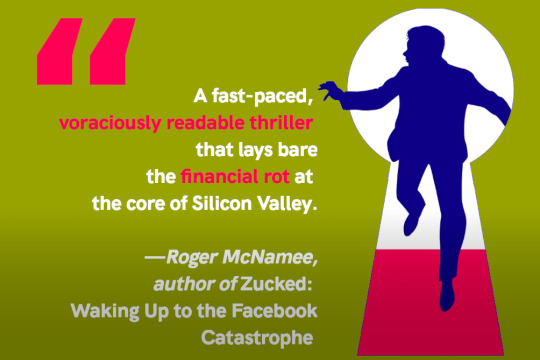
The third book is Picks and Shovels (Jan 2025), and it’s Marty’s first adventure after he comes west to San Francisco and ends up working for the bad guys, an affinity scam PC company called “Three Wise Men” that’s run by a Mormon bishop, a Catholic priest and an orthodox rabbi who fleece their faithful with proprietary, underpowered computers and peripherals, and front for some very bad, very violent money-men.
Next, there’s three Marty Hench short story commissions: the Hench stories are machines for turning opaque finance scams into technothrillers. While finance bros use MEGO (“my eyes glaze over”) as a weapon to bore their marks into submission, I use the same performative complexity as the engines of taut detective stories. Commissioning a Hench story lets you turn your favorite MEGO scam into a science fiction story, which I’ll then shop to fiction websites (every story I’ve written for the past 20 years has sold, though in the event that one of these doesn’t, I’ll put it up under a CC license).
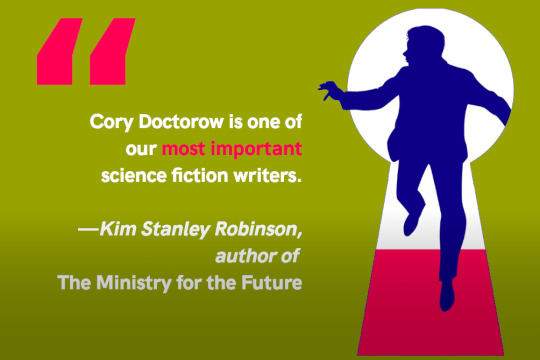
Finally, there’s a super-ultra-limited deluxe hardcover edition — and I do mean limited, just four copies! These leather-bound editions have Will Staehle’s fantastic graphic motif embossed in their covers, and the type design legend John D Berry is laying out the pages so that there’s space for a hidden cavity. Nestled in that cavity is a hand-bound early draft edition of The Bezzle, the sequel to Red Team Blues. The binding is being done by the fantastic book-artist John DeMerritt. Each copy’s endpapers will feature a custom cryptographic puzzle created especially for it by the cryptographer Bruce Schneier.
I often hear from readers who want to thank me for the work I do, from the free podcast I’ve put out since 2006 to the free, CC BY columns I’ve written for Pluralistic for the past three years. There is no better way to thank me than to back this Kickstarter and encourage your friends to do the same:
https://www.kickstarter.com/projects/doctorow/red-team-blues-another-audiobook-that-amazon-wont-sell
Preselling a ton of audiobooks, ebooks, and print books is a huge boost to the book on its launch — incomparable, really. Invaluable.
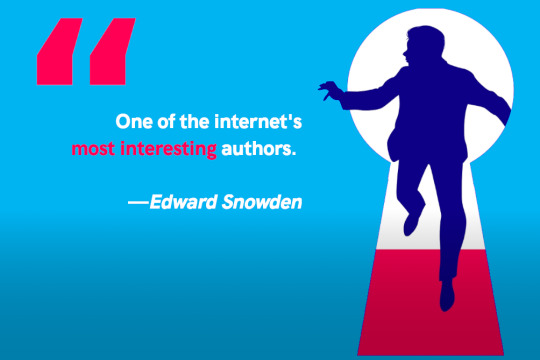
What’s more, helping me find a viable way to produce popular, widely heard audiobooks without submitting to Amazon’s DRM lock-in sets an example for other creators and publishers: we have a hell of a collective action problem to solve, but if we could coordinate a response to Audible demanding the right to decide whether our work should have their DRM, it would force Audible to treat all of us — creators, publishers and listeners — more fairly.
I’ll be heading out on tour to the US, Canada, the UK and Germany once the book is out. I’m really looking forward to as many backers in person as I can! Thank you for your support over these many long years — and for your support on this Kickstarter.

Today (Mar 22), I’m doing a remote talk for the Institute for the Future’s “Changing the Register” series.
[Image ID: A graphic showing a phone playing the Red Team Blues audiobok, along with a quote from Booklist, 'Jam-packed with cutting-edge ideas about cybersecurity and crypto. Another winner from an sf wizard.']
#pluralistic#wil wheaton#drm#chokepoint capitalism#Monopoly#audible#amazon#audiobooks#sf#science fiction#post cyberpunk#cyberpunk#technothrillers#thrillers#heists#cryptocurrency#red team blues#marty hench#kickstarter
1K notes
·
View notes
Text

#transmetropolitan#post cyberpunk#cyberpunk#comic#comics#science fiction#sci fi#Spider Jerusalem#comic book#comic art#fictional character#protagonist
95 notes
·
View notes
Text

Psychopunk: Only Cancer is Immortal (2nd Update!)
Whoa, what a month! I wrote 14,279 words in about three and a half weeks! The leap year was nice, gave me an extra day to tinker with the art you see here!
I know, I know, I'm not exactly a professional digital artist, but I love to dabble (as a treat). Good news, though! My wife, who IS a professional digital artist, agreed to help out once a month with this kind of thing!
This month's section was a ton of fun to write. I'm really looking forward to seeing where the story goes, aren't you? Stick around!
Available for all supporters on my Patreon! Just $1 a month for some of the wildest sci-fi and poetry selections!
18 notes
·
View notes
Text
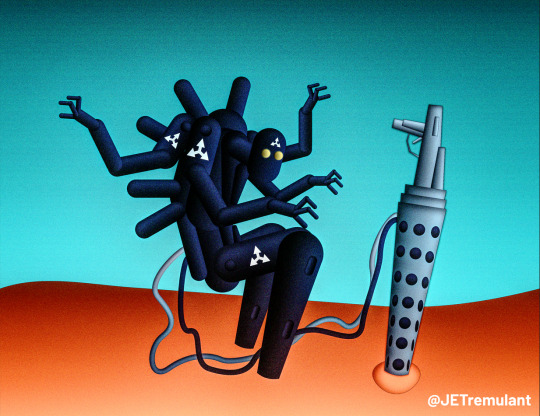
[ THE PUNISHED DEFENDER ] By the Emperor's decree, punishment for not following orders and assassinating that delegate during the wetwork op and playing the toy soldier to a T, soldier M-T778 is permanently assigned to defend the desert flats (site A-11107) until reassigned by the Emperor... even after he's long left this world.
9 notes
·
View notes
Text
Should we keep using AI art?
When I first learned that people had programmed computers to make art, my only thought was that it was an impressive accomplishment – a milestone of human technological progress. And to be honest, I didn’t give it much more consideration beyond that. I didn’t even spend much time playing around with any of the programs available for free.
The criticism I saw at first felt very reactionary and alarmist. Frankly, it sounded a lot like the arguments people have had about any art media going from analogue to digital. Some of it was astoundingly ableist, the implication being that people who see AI art generators as a way to finally be able to make art are just lazy and unwilling to put in the work to get good. A lot more of it came off as snobbish and elitist. I don’t like wading into conversations about what is and isn’t art. Different things resonate with different people, and I’m not interested in gatekeeping creative expression.
While I dismissed those kinds of critiques of AI art, I think it is becoming hard to ignore that there are more pressing criticisms of the technology. They just have a lot less to do with the art itself and everything to how the technology has been developed, and who is benefiting from it.
A look below the surface of AI art
Machine learning has proven to be a powerful tool when it comes to advancing technology. The thing is, for machine learning to work, you need to provide hundreds of thousands of data points. We participate in machine learning every time we look anything up using a search engine. The keywords we enter, the links we click on, how long we interact with a page, are all used to help search algorithms become more effective.
AI art generators are also dependent on machine learning. It might be naive, but I’m going to assume the original intention was to only use works of art in the public domain to train the AI. While there is no way for the artists to predict that their art would be used in this way, at this point, no one owns their intellectual property anymore. I think there is an argument for the transformative nature of AI art somewhere in there. Regardless, it is hard to say that this would harm anyone.
Now, I’m assuming things started to get murky when it came to automating the process of finding, downloading, and inputting data to train the AI. It would take an unreasonable amount of time to do this without taking into account identifying the artists and getting their consent.
One solution was to allow users to help train the AIs. Many hands make light work, after all. Of course, there’s no one moderating who is uploading what, which invariable means it’s been a total free-for-all. It’s clear that a lot of users aren’t bothering to get consent from the creators of the work they’re uploading. More troublesome are the instances of artists who’ve explicitly denied permission for their art to be used this way, and people doing so anyway. I couldn’t say if it occurred to anyone that some artists might mind having their art used in this way, or if they just didn’t care. I don’t know if intent matters at this point.
Ever since it became possible to upload images online, art theft has been a problem. This has always been the double-edged sword of a free and open internet. What’s more pernicious about using art theft to train AI, is that once something becomes a data set, there is no extricating it from the system. Sort of like you can’t remove a specific sheep’s wool from the sweater you’re already wearing.
Does this mean the technology is unethical?
There is a simple answer and a more complex answer. Technology in a vacuum cannot be inherently ethical or unethical. It’s the human component that introduces ethical value. We do this in two ways: either in how we create/develop technology, or in how that technology is used. Without humans to create and use technology, it is affectively an inert lump.
That being said, AI art generators are clearly unethical because they were developed on a foundation of art theft. (And, some might argue, designed to replace human artists to fill the ever-growing demand for “content”.) While some have tried to deny that art theft is a component of AI art, the situation over on Artstation has made it clear that unethical practices are ongoing. It is clear that there exists no safeguards to prevent users from inputting art they have no ownership over.

The problem is bigger than AI art generators
When you place AI art generators within the context of Silicone Valley and tech startup culture, it’s not in the least bit shocking that the technology has turned out to be pretty problematic. This is far from the first time that an idealistic technology has ended up having pretty big, negative social consequences. The problems in Big Tech, I think, boil down to who is in the room making the decisions about direction, functionality, and implementation.
Firstly, diversity and the lack thereof, has never not been an issue in Silicone Valley, and by extension, Big Tech. You can find the stats in this report from the U.S. Equal Employment Opportunity Commission. The bottom line is that the tech industry skews disproportionately white and male, even more so at the executive level. While the report doesn’t touch on class, we can assume it becomes a factor in who has the ability to amass the necessary venture capital for their startups, which also impacts the kind of perspectives in the room.
Secondly, there is no requirement in IT career development that people be taught ethics, or even just how to self-identify and correct for bias. Without a grounding in ethics, no one is having the very important conversations about the impact of technology on vulnerable populations until it becomes an optics problem. In fact, I’d be willing to wager that most of the time, it doesn’t even occur to question whether a technology should be made at all.
These two problems compound, which results in a seeming inability to predict the social harms of the technology being created. There have been too many instances of hard-coded racial bias in the technology we are becoming more and more reliant on. And until we address both of these issues, that’s not going to change.
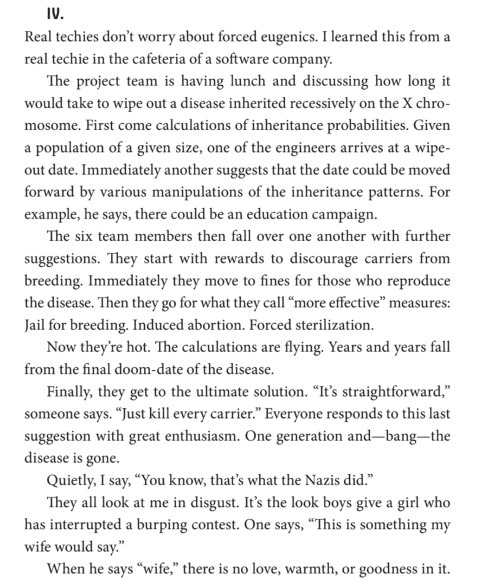
Can AI art be salvaged?
What would it take to salvage AI art generators? Probably starting over from scratch and implementing rigorous safeguards to ensure that nothing can be used to train the AI without vetting and obtaining fully informed consent from creators. Do I think that’s going to happen? Probably not.
The sunk-cost fallacy comes into play here. Building any kind of AI is a very expensive and labour intensive venture. It’s a huge ask to get people to dump all that in the garbage and start over completely from scratch.
More over, and this is where my cynicism comes out, there are always going to be people who believe that all means are justified in the name of human progress – even if that means eradicating the human component altogether. And that’s not something I see society evolving past any time soon.
It’s like something out of a novel…
The more I think about it, the more I’m convinced AI art is truly Cyberpunk. Not because it’s so high-tech and futuristic, but because it exploits the labour of generations in order to remove the human element of something that is a fundamental aspect of humanity. All so that people, but mainly companies, can benefit monetarily. I’d say that AI art fits in very well in a genre defined by its dehumanizing, high-tech future, don’t you?
#ai#no to ai generated images#no to ai generated art#ai art theft#ai art#ai art generator#midjourney#cyberpunk#post cyberpunk#distopia#my writing#essay
105 notes
·
View notes
Text
Kyle in da long coat what will he do

#sona#sona art#my sona#sci fi sona#sci fi character#cyberunk aesthetic#post cyberpunk#sona: Kyle#my art
6 notes
·
View notes
Text
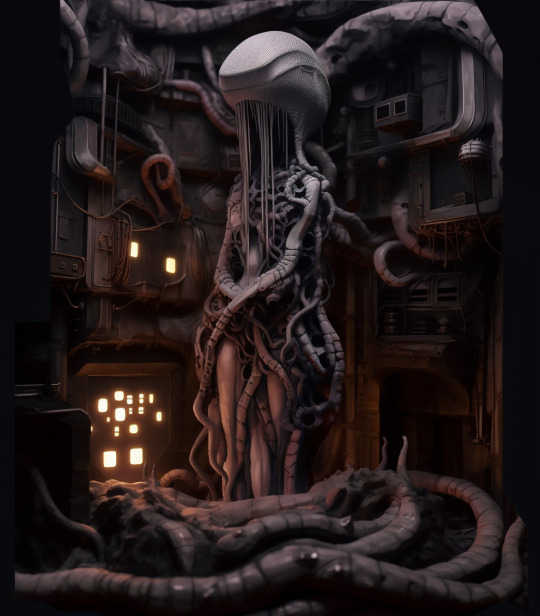
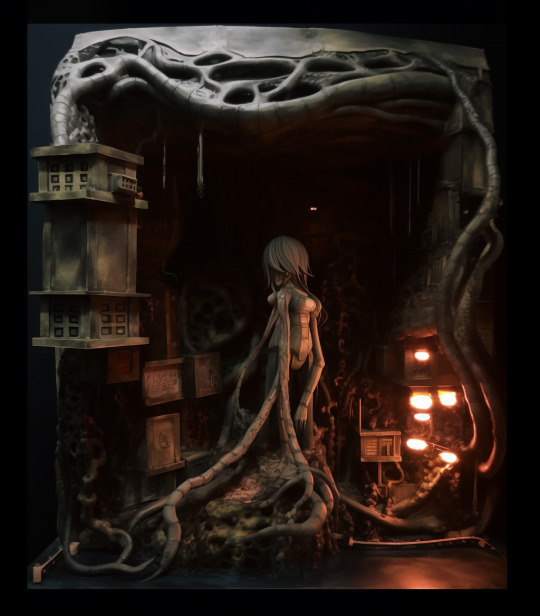
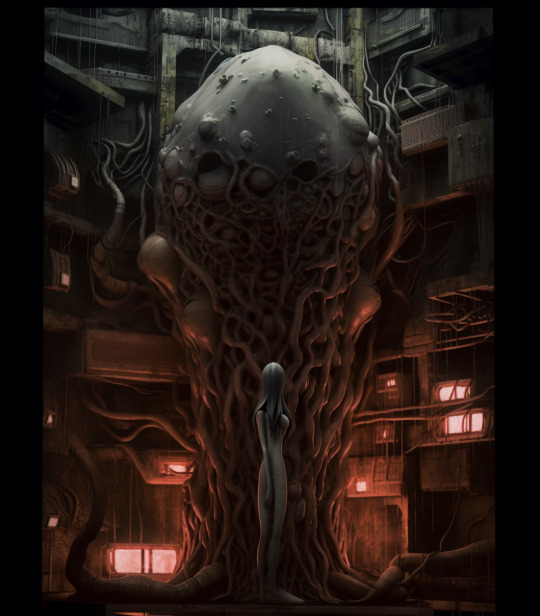

diorama of "THE MOTHER"
34 notes
·
View notes
Text
Can anyone imagine what Tf2 Freaks-World would be like in a cyberpunk or postcyberpunk style world????
#freak fortress 2#tf2 freak#team fortress 2#freaks#tf2 freaks#freak fortress#cyberpunk#post cyberpunk
10 notes
·
View notes
Text
youtube
Software: Krita
Graphics tablet: Wacom intuos 4100k
#art#fantasy#digital art#godynart#denis godyna#godyna#city#sky#landscape#drawing#cyberpunk#cybercore#cybersecurity#post cyberpunk#krita#Youtube
10 notes
·
View notes
Text
Briareos from Appleseed. Such an overlooked and often forgotten anime and manga series.
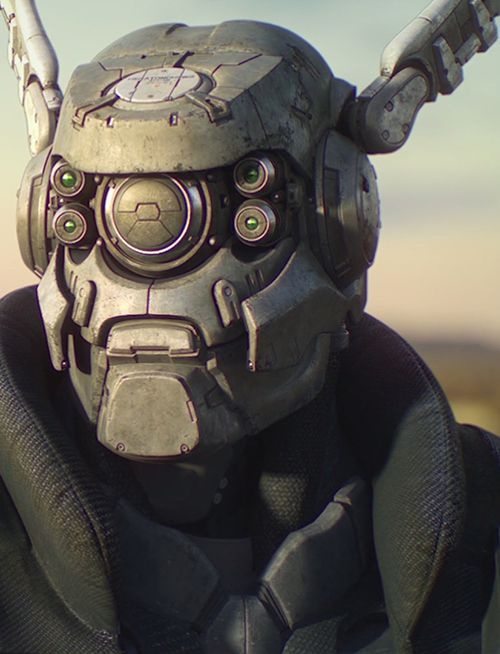
#cyberpunk#science fiction#scifi#briareos hecatonchires#appleseed#masamune shirow#anime#manga#appleseed alpha#cyborg#post cyberpunk
128 notes
·
View notes
Text
TIME AND AGAIN
Summary: In the far future, Sameera volunteers to test a memory simulator that allows the user their memories. Her choice? A memory from three years ago but soon she realises she craves to go back again and again
Rating: G
Tags: Original female character x original female character, futuristic setting, post cyberpunk, timeloops, science fiction, short story
Word count: 3.2k
This is my first time publishing one of my short stories. I originally wrote this short story as a part of the Sylki Zine. A huge thanks to @queen-of-meows for helping me with the plot of this short story. If you like it, please do like and reblog!!
‘Every man who remembers must remember something, and that which he remembers is called the object of his remembrance.’
These words, handpicked by their president from Thomas Reid’s ‘Essays on the Intellectual Powers of Man’, were inscribed on the plutonium plaque that hung on the wall of their research center. Sameera had walked past this plaque many times before but never had she ever read those words, until today.
The object of remembrance.
A lone tear rolled down her cheek. Her heart ached but she was skilled in pushing away her sorrows. Slowly instead, she laid down on the full body, flatbed scanner. The wires attached to her arms tingled with tiny jolts of electricity as a technician secured the electromagnetic band around her head.
“Sameera, are you comfortable?” asked Mr. Glen, her testing officer. She gave him a thumbs up.
He smiled. “Scared?”
She shook her head in refusal. “There's nothing to be scared of. I know the procedure, I have worked on this project for years.”
Mr. Glen attached a clip to the tip of her index finger. “We will be monitoring your vitals and bring you back if there's any problem. There shouldn't be any issue but I have to ask you again- Are you sure you want to volunteer?”
Sameera nodded. Her colleague patted her shoulder, then entered the initiate command on the main computer.
The welcome song, a piece of classical music, rang in her ears. Sameera saw her teammates walk around the mainframe. Her eyes felt heavy. She blinked once, then twice before her eyelids fell shut.
—
—
—
Sameera woke up with a start and looked around. She was at her workstation along the mainframe at the research center. Her work screen was filled with lines of codes she needed to run and test.
Her eyes went to the top left corner of her screen. The date was displayed in a deep blue colour. A small smile made its way across her face.
26 November, 2350
She was here.
Her planner lay open by her side. She still had piles of work to finish– she had to run the codes, record their output, then file her observations into the database. There was also the report she needed to prepare.
Sameera closed her planner shut with a thud. Then she got up from her workstation and walked out. Her coworkers shot her flabbergasted looks. Her manager barred her from leaving. But it didn't matter. Nothing else mattered except for the one thing she came here for.
As the elevator pod took her down to the ground floor, Sameera checked her appearance in the shiny chromium of its walls. She fixed her dark raven hair, smoothing away any flyaways and removed her lab coat, scrutinizing her appearance.
There were dark circles under her eyes. She was in her work clothes, a white button up shirt with slacks. Sameera adjusted her attire and nodded satisfied. The white of her shirt contrasted well with her dusky, brown complexion. She remembered bringing a trench coat along with her, a perfect dress up for the evening.
Once she reached the ground floor, Sameera quickly made her way to the reception. The robotic assistant, an earlier model she had totally forgotten about, greeted her at the front desk. It led her to her locker where she collected her belongings, replaced her lab coat with her trench coat and went about her way.
The nightlife was in its full glory when she stepped out of the building. The nano processor installed on her wrist displayed the time– 7:30 pm.
30 minutes to 8.
Her destination wasn't too far away so she decided to walk. Along the way, she stopped by the airbrush booth to get her makeup done and bought a bouquet of flowers from the floral counter. A few minutes more and she reached the place.
A bright pink neon sign, hung at the entrance of the restaurant, glowed brightly in the night. The host, an android with a fake looking skin (the unrealistic skin always gives them away), welcomed her. “Good evening. How can I help you?”
Now that she was finally here, she realized how scared she truly was. Sameera choked on her words. “I.. I have a reservation today.”
“This way please,” the android replied in its robotic voice and led her inside.
Sameera followed it, her heart racing violently. Her palms sweated, her stomach twisted with dread. She turned round the corner, when she saw her sitting in a booth at the back of the restaurant.
The sight knocked the wind out of her. Sameera froze, tears welling in her eyes. She looked ethereal, wearing a teal dress, her beautiful, curly hair pinned up in a bun.
Oh how had she missed her. Her big, brown doe like eyes, her soft chocolate skin, her big smile, her laughter, her embrace. She was here and she was real.
“Sameera?” she called out, waving at her from the booth. “You are here.”
Sameera slowly made her way towards her, wiping away the tears in her eyes. “Rumi.”
Rumi got up and pulled her into a hug. “Happy wedding anniversary, my dear wife. I was so scared you won't make it but here you are.”
Sameera choked on a sob. “I came, Rumi.”
Rumi kissed her forehead. “Yes, you did. I am so happy, Sameera.” Then, she led her towards the table. “Come, let's sit down.”
Sameera sat down on a chair. Rumi sat across her, going through the menu. “What would you like to drink? Let's see it's almost 8.”
“Rumi,” Sameera interrupted her, reaching out to hold her wife’s hand. “You don't think I am a bad wife now, do you?”
Rumi knitted her brows in confusion. “What are you saying?”
“Tell.. tell me you are happy with me,” said Sameera, her voice trembling.
“Oh Sameera,” Rumi replied. “My dear wife. You are so stupid. If only you knew–”
___
___
___
Sameera opened her eyes, shocked. Her colleagues circled around her, looking at her in anticipation. The ending song played in the background, thanking her for her patronage.
Mr. Glen removed the electromagnetic band from her head, helping her sit up. “So, how did it work? Were you able to re-access your memory?”
Sameera nodded her head. “Yeah, it was my wedding anniversary three years ago. Why am I back?”
Mr. Glen handed her a glass of water. “Oh, 30 minutes were up. The software can only run the test for thirty minutes, as you know.” He picked up his tablet from the side. “So now the details. How was the memory augmentation, the environment reconstruction and the virtual space navigation?”
Sameera wiped her cheeks. “I need to go back. Please send me back.”
“But why?” asked the technician. “This was just a test run.”
“I need to go back again. I need to check the space navigation again. Please just send me back.”
Mr. Glen sighed. “Just one more time ok.”
Sameera gave him a grateful smile, then laid down on the scanner again. The technician secured the electromagnetic band around her head. The welcome song played, her eyes fell heavy.
___
___
___
Sameera woke up. She was at her workstation, her screen lined with codes. She paid no heed to her surroundings this time around– neither her colleagues nor her manager.
She just ran. Sameera ran as fast as she could. She raced towards the reception and grabbed her trench coat. Then, he walked in haste towards the restaurant, not bothering to get herself airbrushed or buying flowers.
The host welcomed her and led her in, again. Sameera turned the corner to find Rumi sitting at the booth. Seeing her for the second time still hurt as much.
“Sameera?” Rumi called out, waving her hand. “You are here.”
Sameera walked up to her quickly. Rumi got up and hugged her. “Happy wedding anniversary, my dear wife. I was so scared you won't make it but here you are.”
Sameera held her wife's face in her palms, caressing it gently. “There's nowhere else I want to be. I want to be here, with you, forever.”
Rumi gave her a smile. “I am so happy, Sameera. Come, let's sit down.”
Sameera sat down on a chair, Rumi sat across her, going through the menu. “What would you like to drink? Let's see, it's a few minutes to 8.”
“Rumi,” Sameera interrupted, lacing their hands together. “I can't tell you how much I love being with you. I was so stupid to throw this away, to let you down for things that never mattered. Nothing mattered other than you, and I am sorry I didn't appreciate you the way you deserved.”
Rumi gave her another smile. “I am so glad to hear you say that.”
“Tell me,” pleaded Sameera. “Are you happy to marry me?”
Rumi looked at her puzzled. “Oh Sameera!”
___
___
___
Sameera opened her eyes, frustrated. Mr. Glen stood by her side, checking her vitals. “Welcome back.”
Sameera got up, disgruntled. “30 minutes are over?”
He nodded his head. “No more going back now.” Picking up his tablet, he patted her shoulder. “Are you okay?”
She nodded. Satisfied, Mr. Glen proceeded to ask her a series of questions about her experience in the memory simulator. Sameera answered them absentmindedly, her thoughts far away– to a day three years ago, remembering.
Remembering as it really happened
‘26 November, 2350
It was a Sunday as well as her wedding anniversary but Sameera wasn't home with her wife Rumi, celebrating. Instead, she was seated in her work station, working diligently on Project Remembrance– an AI powered memory simulator that would let people relive their most cherished memories. A dream job for her, as she liked to say some time ago but she wasn't so sure now.
When she left for the research center this morning, she had promised Rumi she would be there for their dinner date at 8 tonight. Now, looking at the time, Sameera realized it would be impossible.
She still had piles of work left to do, and both her managers had been unable to let her off until she wrapped up her work, owing to an investor's meeting a few days later.
Sameera ran the code on her screen, hoping to miraculously wrap up her work in half an hour or so. An error message appeared on the screen, breaking her bubble. She teared up in frustration– she wouldn't be able to leave today.
She tapped the nanoprocessor on her wrist. ‘Send a message to Rumi. Tell her I won't be able to make it’. Then she returned to work, tears of frustration rolling down her cheeks.
By the time she reached home, it was already midnight. Rumi stood by the kitchen sink, rinsing off some dishes. She wore her night pajamas, her hair undone.
“Happy wedding anniversary,” said Sameera slowly.
“It's 12:15,” replied Rumi curtly. “Our wedding anniversary was yesterday. But forget that, tell me how was your Sunday that you spent at work?”
“Oh for heaven's sake Rumi!” Sameera shot back, irritated. “You know my work is demanding. I expect you to be more understanding.”
Rumi turned towards her in anger. “I am not understanding?! This has been going on for months. You are always at work, even on weekends. I don't remember when we last spent time together, to watch a movie or go out for dinner. How can you blame me?”
Sameera threw her hands in the air. “So, it's my fault. Everything is my fault.” She sank on the couch, crying. “You love your work and spend hours painting, it's not an issue. But if I am stuck at work, I am the bad one.”
Rumi pressed her head. “It's not the same. My work brings me joy and fulfillment. I am not trapped by corporate moguls who drain me out, forcing me to work till midnight on a Sunday. Babe, you really need to leave this job.”
“You can never be happy for me, can you?” Sameera asked, bitterly.
“If you expect me to be happy to see you like this, then yes I am not happy,” Rumi replied firmly.
“I can't understand why you are so pressed!” said Sameera
“Because it was our wedding anniversary and I was alone, Sameera!”
“It's no big deal. It will come next year, and the next. Do you have to make such a fuss!”
Rumi looked at her stunned. There were tears in her eyes. “What was I thinking, marrying you?”
She turned around and left, banging the bedroom door. Sameera stayed put on the couch, crying.’
Sameera sat on her workstation, going through a programme. Most of her colleagues had already left, and the few that remained were packing up their things. Her mind kept drifting back to Rumi. Her smile, her laughter, her happiness were all seared in her head. It brought back the pain of losing her along with guilt.
She needed to meet her one last time. She needed to fix what she messed up three years ago. For Rumi, for herself.
Sameera switched off her screen and made her way towards the testing area. The place was empty by now. Putting in the initiate command, she placed the electromagnetic band on her head and lied down on the scanner, revisiting her memory again.
And again.
And again.
One time turned to two, two times turned to many. Each time she went back, re-lived her memory only to feel an aching desire to go back. No matter how many times she saw Rumi’s smile or experienced her warm embrace, it was never enough. She needed more.
She hoped to fix things, she hoped for happiness. She hoped the dead weight she had been carrying for the past three years, be finally lifted off her chest.
And yet with each try, it felt hollow. Rumi felt less like a real person, and more like a figment of her own imagination, turned real via a sophisticated AI programme. Each time she appeared as what Sameera wanted but could never be what she needed because she could never be real.
Her real Rumi.
Wiping away her tears, Sameera laid down on the scanner again. The welcome song played, her eyes fell shut.
___
___
___
Sameera woke up with a start. She was at her workstation yet again. She did what she had done a dozen times now. She descended down the elevator, raced to the restaurant and went straight to the back of the restaurant to find Rumi.
“Sameera?” she said, waving her hand. “You are here.”
“I am,” she replied tearfully. “Rumi, tell me you are happy to marry me?”
Rumi looked at her confused, then smiled. “Oh Sameera, of course I am happy to marry you. You are the best wife in the world.”
The words didn't bring her the satisfaction she thought she would find. Instead, they broke something inside her, crushed and destroyed it until all that was left was pain.
The pain of losing Rumi.
“Liar,” Sameera shot back. “You are a bloody liar because I am not a good wife. You should regret marrying me, you should resent me, that's how you should act but why would you?”
Rumi placed an arm on her shoulder. “As your wife–”
“You are not my wife!” Sameera shouted. “You are not Rumi. You are just a reconstruction of my memory, in a virtual space rendered by an AI. None of your words are Rumi's words, none of your joy is Rumi's joy. You are governed by an algorithm that I developed. You are not real. You are not my Rumi.”
Rumi, the AI reconstruction of her, shifted uncomfortably. Tears rolled down Sameera's eyes.
___
___
___
Sameera woke up, her body drenched in sweat. The vital monitor on the side beeped loudly. Mr. Glen stood in front of her, worry etched over his face. “Are you okay?”
Sameera got up, wiping off her sweat. “I can explain.”
“You wanted to relive your memory over and over,” he supplied, helping her off the scanner. “What memory are you re-accessing?”
Sameera sat on a nearby chair, looking straight ahead. “My wedding anniversary, three years ago.”
“Must be a really happy memory for you,” said Mr. Glen, sitting in front of her.
Sameera let out a bitter laugh. “Oh no! There was no happiness because I chose to stay in my office working, instead of being with my wife. I swear I tried but I just couldn't leave. And then when I went home, what did I do? I told Rumi it was no big deal, that our anniversary will come next year. She told me she regretted marrying me.”
Her colleague nodded. “Then what happened?”
Tears flowed down her cheeks. “Two… Two months later, Rumi suffered a cardiac arrest and passed away. There was no more anniversary for us.”
The pain she had been pushing away all these years finally broke free. She grabbed her face in her hands and cried, letting her sorrow wash over her.
Mr. Glen rubbed circles around her back. “Is that why you kept revisiting the same memory?”
She nodded through her tears. “I thought I could fix things with Rumi, thought I could show her I love her but –”
“But it brought you no joy,” said Mr. Glen. “Because your wife is gone. She isn't here to experience your love. You hoped changing your memory would ease off your guilt, for you. But it won't because none of it is real. It is just a memory after all.”
“I just wish I could tell her I love her,” said Sameera sadly. “I wish I could make her not regret marrying me.”
Mr. Glen shook his head. “Did she leave you?”
“No.”
“See, she knew and she doesn't regret marrying you. She was there, wasn't she?” he asked.
Sameera nodded.
“All you can do is honor your wife's memory and move on from your guilt, Sameera. There's nothing. That is more than enough. You need to let go.”
Mr. Glen gave her another pat, then walked out the room. Sameera stayed seated for some time, contemplating his words. Then, she walked towards the mainframe. Her eyes fell on the initiate command on the screen. She could relive her memory once again if she wanted but.
Sameera shut down the system. Then she grabbed her belongings and left. On her way out, she grabbed an application for her resignation. Then she stepped into the night, looking at the stars.
“I am sorry, Rumi,” she said. “And I love you.”
A star twinkled brighter. She smiled, then walked off into the crowd.
#short story#original fiction#f/f romance#science fiction#post cyberpunk#original characters#poc characters#lgbtq story#sapphic
4 notes
·
View notes
Text


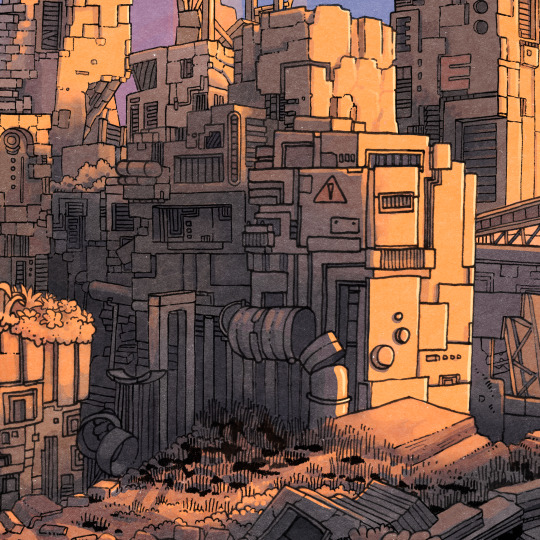

Metal Valley
Part of my ongoing series of images from a rundown industrial area of a large city post civilizational collapse. There's no particular story relating to this scene, it just materialized in my head one day so I decided to draw it.
23 notes
·
View notes
Text

High from the haze, toes in the lake
Imagine sitting on your friend's dock. You dip your feet in the lake’s green tinted water. It feels refreshing against the sticky hot humid air. You are smoking a joint. The high feels nice. Your friends laugh. You laugh too. You haven’t felt this quaint since the war.
5 notes
·
View notes
Text
We're on Royal Road, baby! New chapter every workday!
6 notes
·
View notes
Text



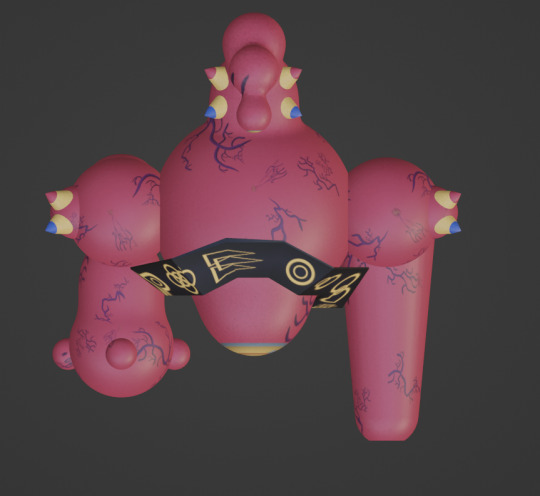
[ ORDERLORD ]
Standard vat-grown agent of the UOLO (Universal Order for Law & Organization), a force that seeks to ensure the ongoing "life executable" still functions and seeks out to "correct" any disruptions to it. Easily adaptable for various jobs.
12 notes
·
View notes
Video
youtube
「ブレイカー」BREAKER /// Cyberpunk Short Film /// 50+ Awards 4K
10 notes
·
View notes